高二英语选修7 unit5教案
高二英语选修7教案:Unit5TravellingabroadPeriod5 含

Period 5Using Language:Reading and Speaking设计者许蓓教学目标1.语言知识目标:a.重点词汇parallel,abundant,govern,destinationb.功能句式We could...You might...It would be possible to...It isn't possible to......would be a perfect place for us.I don't think you'd enjoy......would probably suit us.It's out of the question.2.语言能力目标Through reading,enable the students to acquire detailed information about Peru.3.情感态度目标Help the students learn how to express likes and dislikes,probability and improbability with the target language.重点难点教学重点:Introduce briefly and properly the country—Peru.教学难点:Talk about tours in and around Cuzco with functional items given.教学准备A slide projector and a tape recorder.Let students surf the Internet to get information about Peru.教学过程Lead-inAsk the students something about their travelling abroad.(What places would you like to visit?Why?Where can you get information about places of interest?)[设计说明]联系生活实际,导入话题,激发学生对话题的兴趣,为下文作铺垫。
高中英语选修七Unit+5第2-3课时+教案

高二英语选修7 Unit 5 第2-3课时Language points Teaching Goals:Enable the Ss to learn about Xie Lei’s school life in LondonHelp The Ss learn how to deal with problems that they would face when studying in a foreign country.Teaching important and difficult points:Help Ss to summarize the benefits and difficulties of living in a foreign country.Part 1 Language study:board vt.qualification n.recommend fort n.substitute n.requirement n.acknowledge vt.occupy v.enterprise n.succeed v.comment n&v.1.习惯于2.全神贯注3.适应4.就……而言5.保持, 继续做6.相适应7.无拘束8.安顿下来9.成功做某事10.与……有共同之处Part 2 Language points1. board n.&v.1) 上(船或别的交通工具)2) n. 木板,纸板,董事会,委员会3) 供食e.g. board a plane_________________I’m _________with a friend. 我向朋友提供食宿与board相关的短语:on board (a ship /a train)go on board (a ship /a train)on the boardboard of honor2. It was the first time she had ever left her motherlandIt is the /one’s first time that subject___________It was the first time that subject ____________这是我第一次来北京______________________________________.辨析: the first time与for the first time?I thought her honest ___ I met her。
人教版高中英语选修7Unit5Travelling abroadPeriod 2 教案

高中英语 Unit5 Travelling abroad Period 2优秀教案新人教版选修7Teaching objectives 教学目标1.Language aimsThe students will be able to:(1)Write and use words and expressions freely and correctly.(2)Learn the writing style of the passage.2.Ability aimsThe students will be able to:(1)Discuss some problems in English and exchange their ideas.(2)Learn how to deal with the problems that they would face when studying in a foreign country.(3)Write a short reply letter,telling something about Xie Lei's life and study in London to her friends in China.(4)Use their imagination,according to Xie Lei's life and study in London,write a short composition about a foreign student studying Chinese in China.3.Emotional aimsStudents will be able to learn the ability of facing the difficulties,analyzing the reasons,overcoming and solving the problems by themselves.Students also study hard and love our motherland to make our motherland become prosperous and strong.Teaching important and difficult points教学重难点Students will be able to summarize the benefits and difficulties of living in a foreign country.Teaching methods教学方法Task-based method;discussing;brainstorming and speakingTeaching aids教学工具(1)A blackboard(2)A projector and a computerTeaching procedures教学过程Step 1Revision and lead-inActivity 1(1)联系实际导入新课T:What was the slogan for Beijing Olympics?Ss:One world one dream.T:Yeah,the world is becoming smaller and smaller.During the Beijing Olympics,many foreigners visited China.As a Chinese,would you like to travel or study abroad?(2)Come to the new unit—Unit 5Travelling abroad(3)Ask the students if they still remember the topic about travelling we have learnt in Book 1.Talk about travelling freely.设计意图:通过联系生活实际导入新课,引出本单元话题——Travelling,实际这也是学生感兴趣的话题,这样能调动课堂气氛,使学生更容易进入状态。
高二英语(人教版)-选修七 Unit 5 Travelling abroad (5)-教案

从练习中发现、归纳并感受非限制性定语从句的语用功能。
引导学生关注、比较、理解并自主总结出目标语言的结构和语用功能。
学生通过各种活动收集关于旅行计划和中秋节的信息,了解并练习非限制性定语从句的用法。
1. recognize the usages of the non-restrictive attributive;
2. use the non-restrictive attributive clause to revise sentences ;
3. write a letterof atravelplan andintroductionon the Mid-autumn Day.
2.1)Who would help Xie Lei if she met troubles in her life?
2)What do you think of “becominga host family”?
学生根据课文信息回答。
利用在课文中出现的人物进行情景导入,对出国留学及XieLei在国外的生活进行讨论,激发学习动机,引起学生学习语法的兴趣和对语法规则的思考,并为最终的输出任务做铺垫。
3. Sspracticeusingthe grammar in the sentences.
1)Complete the following sentences byfilling in proper pronouns or adverbs.
2)Combine the sentences by using the non-restrictive clause.
Unit5Readinglanguagepoints(新课标版高二英语选修七教案教学设计)
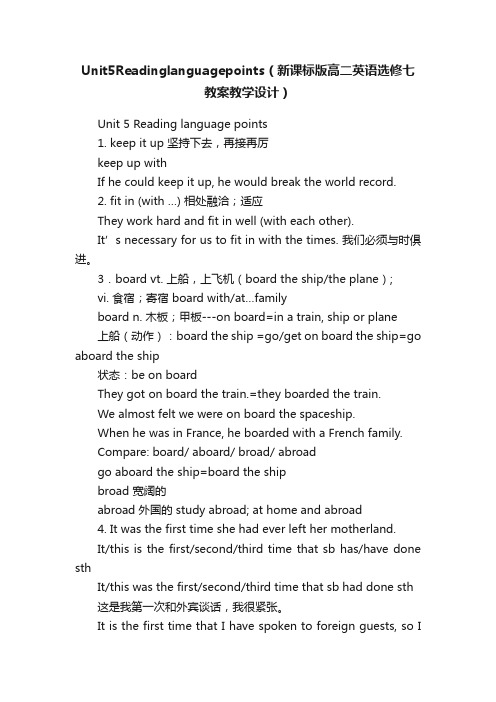
Unit5Readinglanguagepoints(新课标版高二英语选修七教案教学设计)Unit 5 Reading language points1. keep it up 坚持下去,再接再厉keep up withIf he could keep it up, he would break the world record.2. fit in (with …) 相处融洽;适应They work hard and fit in well (with each other).It’s necessary for us to fit in with the times. 我们必须与时俱进。
3.board vt. 上船,上飞机(board the ship/the plane);vi. 食宿;寄宿board with/at…familyboard n. 木板;甲板---on board=in a train, ship or plane上船(动作):board the ship =go/get on board the ship=go aboard the ship状态:be on boardThey got on board the train.=they boarded the train.We almost felt we were on board the spaceship.When he was in France, he boarded with a French family.Compare: board/ aboard/ broad/ abroadgo aboard the ship=board the shipbroad 宽阔的abroad 外国的 study abroad; at home and abroad4. It was the first time she had ever left her motherland.It/this is the first/second/third time that sb has/have done sthIt/this was the first/second/third time that sb had done sth 这是我第一次和外宾谈话,我很紧张。
人教版高二英语选修七Unit 5 Traveling Abroad教案设计

3. I went to the place _______ I visited ten years ago.
4. I went to the place _______ I worked ten years ago.
5. This is the reason ______ he was late.
4. Explanation
5. Discussion.
Step 1: Lead in
Enjoy an English song with attributive clauses. (设设计目的:通过听歌填词,引起学生对定语从句的注意和兴趣,并引出本节课的主题。)
Step2: The definition and structure of attributive clause 定义和结构
know other reasons? Guess! (设计目的:通过对点练习,巩固定语从句的结构和关系代词的基本使用.)
Step 5:Summary 关系词
指人
指物
从句中的作用
Who
√
主语,宾语
Whom
which
that
whoes Step 6:Homework 课外作业
1. Finish the exercises in the learning plan
Teacher will present a picture of her, and lead students to say some attributes. And then teacher
explains the antecedent, relative pronouns and clause. (设计目的:教师展示学生感兴趣的照片,引导学生自己说出定语和定语从句,以便激发学生学
高中英语选修7 Unit5 Travelling Abroad教案
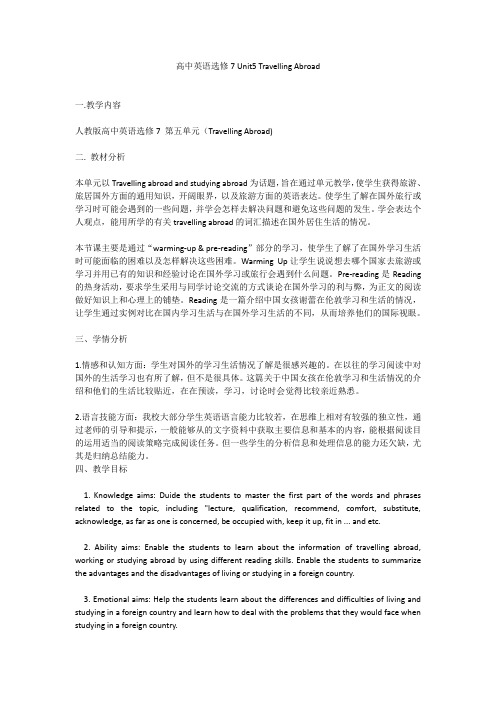
高中英语选修7 Unit5 Travelling Abroad一.教学内容人教版高中英语选修7 第五单元(Travelling Abroad)二. 教材分析本单元以Travelling abroad and studying abroad为话题,旨在通过单元教学,使学生获得旅游、旅居国外方面的通用知识,开阔眼界,以及旅游方面的英语表达。
使学生了解在国外旅行或学习时可能会遇到的一些问题,并学会怎样去解决问题和避免这些问题的发生。
学会表达个人观点,能用所学的有关travelling abroad的词汇描述在国外居住生活的情况。
本节课主要是通过“warming-up & pre-reading”部分的学习,使学生了解了在国外学习生活时可能面临的困难以及怎样解决这些困难。
Warming Up让学生说说想去哪个国家去旅游或学习并用已有的知识和经验讨论在国外学习或旅行会遇到什么问题。
Pre-reading是Reading 的热身活动,要求学生采用与同学讨论交流的方式谈论在国外学习的利与弊,为正文的阅读做好知识上和心理上的铺垫。
Reading是一篇介绍中国女孩谢蕾在伦敦学习和生活的情况,让学生通过实例对比在国内学习生活与在国外学习生活的不同,从而培养他们的国际视眼。
三、学情分析1.情感和认知方面:学生对国外的学习生活情况了解是很感兴趣的。
在以往的学习阅读中对国外的生活学习也有所了解,但不是很具体。
这篇关于中国女孩在伦敦学习和生活情况的介绍和他们的生活比较贴近,在在预读,学习,讨论时会觉得比较亲近熟悉。
2.语言技能方面:我校大部分学生英语语言能力比较若,在思维上相对有较强的独立性,通过老师的引导和提示,一般能够从的文字资料中获取主要信息和基本的内容,能根据阅读目的运用适当的阅读策略完成阅读任务。
但一些学生的分析信息和处理信息的能力还欠缺,尤其是归纳总结能力。
四、教学目标1. Knowledge aims: Duide the students to master the first part of the words and phrases related to the topic, including "lecture, qualification, recommend, comfort, substitute, acknowledge, as far as one is concerned, be occupied with, keep it up, fit in ... and etc.2. Ability aims: Enable the students to learn about the information of travelling abroad, working or studying abroad by using different reading skills. Enable the students to summarize the advantages and the disadvantages of living or studying in a foreign country.3. Emotional aims: Help the students learn about the differences and difficulties of living and studying in a foreign country and learn how to deal with the problems that they would face when studying in a foreign country.五、教学重点及难点1. Widen the vocabulary range. Develop the students’reading skills namely skimming and scanning and so on.2. Guide the students to summarize the benefits and difficulties of living in a foreign country.六. 教学方法1.演示法:通过相关的图片、PPT等网络多媒体辅助显示给学生看,便于学生对基础知识和背景知识的把握,并从旧知识中获得启迪,从而达到解决问题的目的。
人教版高中英语选修7教案Unit 5 Traveling abroad

人教版高中英语选修7教案Unit 5 Traveling abroad Unit Traveling abrad一、语言要点I单元要点预览(旨在让同学整体了解本单元要点)词汇部分词语辨析1bard/abard/abrad/brad 2get used t/be used t/used t 词形变化1qualifiatin n 资格, 条qualif v (使)具有资格,2 preparatin n 准备, 预备prepare v 准备, 预备,3 frtable ad 舒适的frt n 安慰v 安慰, 使(痛苦等)缓和4 require v需要, 要求, 命令requireent n 需求, 要求, 必要条gvern v 统治, 支配管理gvernent n 政府,重点单词1 qualifiatin n资格;证明2 preparatin n准备;预备3 reend vt推荐;建议4 frt n舒适;安慰vt安慰substitute n代替者;代用品vt用……代替……6 anledge vt 承认;确认;答谢7 up vt占有;占领;占据8 gvern vi≈vt统治;支配;管理9 ntradit vt 反驳;反对;否认; 与矛盾10 abundant ad丰富的, 充裕的,重点词组eep it up 保持优秀成绩;继续干下去as far as ne is nerned 就……而言settle in(迁入新居;更换工作后)安顿下ut f the questin不可能的重点句型1 “It’s nt ust stud that’s diffiult u have t get used t a hle ne a f life, hih an tae up all ur nentratin in the beginning,” exp lained Xie Lei, h had lived all her life in the sae it in hina2 I have been s upied ith r that I haven’t had tie fr sial ativities重点语法被动语态(II)(见语法专题)II 词语辨析(旨在提供完形填空所需材料)1) bard/abard/abrad/brad【解释】bard n(木, 纸)板;滑水板vt用板铺;用板盖; 上(船、车、飞机)船舷; 甲板;abard adv ≈prep 在船(飞机、车)上, 上船(飞机、车)abrad adv往国外, 海外, 找教案http://zhaiaanbrad ad宽的, 阔的, 广泛的adv宽阔地【练习】选择bard/abard/abrad或brad并用其适当的形式填空1) Seties hen derating, e need t sa a ______ in half2) She said gd-be t her friends and _______ a plane fr Ne r3) She ent _______ the plane4) During the Spring Festival, an peple hse t travel _______) Liu xiang is faus fr his speed in hurdle at he and _______6) The gnasti ah has _______ shulders7) The rbber h rbbed the ban f ash ________ dalight as sentened t death at lastes: 1) bard 2) barded 3) abard 4) abrad ) abrad 6) brad 7) brad2) get used t/be used t/used t【解释】get used t +sth/ding sth 习惯于……(侧重于动作)be used t+sth/ding sht 习惯于……(侧重于状态)be used t d 被用做……(被动语态)used t过去常常(强调现在不再存在)【练习】选择get used t/be used t或used t,并用其适当的形式填空1) e ________ send ards t eah ther b pst N e send eletrni ards in stead2) I’sure that he ill sn __________ untr life3) N peple in it _________ shpping n the internet4) st f the d there ________ae furniturees: 1) used t 2) get used t 3) are used t 4) is used t III 词性变化(旨在提供语法填空所需材料)1qualifiatin n 资格, 条qualif v (使)具有资格,2 preparatin n 准备, 预备prepare v 准备, 预备,3 frtable ad 舒适的frt n 安慰v 安慰, 使(痛苦等)缓和4 require v需要, 要求, 命令requireent n 需求, 要求, 必要条gvern v 统治, 支配管理gvernent n 政府,【练习】根据句子结构,用括号内所提供词的适当形式填空1) ---Are u sure he is ________ t drive a ar?---es He gt his driving _______ befre he ______ as a teaher(qualifiatin)2) Ever fail is bus ______ fr the Spring Festival fr there are lts f _______ t d (preparatin)3) Anne h launhes a ar is ______ and is _______ b peple h lve peae all arund the rld (ae)4) The _______ f energ ill help us researh the a t save and _______ the energ (nserve)) Thugh the sup is _______, I’ve lst sense f ______ and it ____ust lie ______ater(taste)es:1) qualified; qualifiatin; qualified 2) preparing; preparatin 3) aese; aed 4) nservatin; nserve ) tast; taste; tastes; tastelessIV 重点词汇(旨在提供综合运用所需材料)1 qualifiatin n资格;证明[重点用法]qualif v (使)具有资格,证明合格qualifiatin as当任(职务等)的资格找教案http://zhaiaanqualifiatin fr在(某方面)具有资格取得资格,合格qualif as取得……资格qualif fr有……资格,有……权;应得;使合格,使能担任,使适合于qualif sb.t d sth.使某人有资格做某事[典例]1) hat’s the qualifiatin as a dtr?取得当一名医生的资格是什么?2) hat qualifiatins have u gt t have fr this b? 申请这个工作你得要具有的条是什么?3) D u qualif fr the vte? 你有投票资格吗?4) I hpe t qualif as a teaher 我希望取得教师资格。
高中英语新人教版精品教案《选修七 unit5 usinglanguage》

Unit5 Traveling AbroadUsing language该部分包括“听力”、“读和说”和“写作”三大块。
这三部分的话题都是有关旅游的。
问题的设计由浅入深,层层递进,既练习了听力又增长了知识,丰富了本单元的内容。
本节课的内容主要是处理“读和说”这一块。
Teaching aims:1. To ensure Ss have really grasped the important words and phrases of the unit.2.Through listening and reading, enable the ss to acquire detailed information about Peru. Teaching important and difficult points:1.To get Ss to know something about how to give factual information about a place.2.Talk about toursTeaching methodListening, reading and talkingTeaching AidsMultimedia and blackboardTeaching Procedures:Step 1 RevisionHave a revision of the words in this unit.Step 2 lead-inHave a quiz to see how much they know about PeruStep 3 ListeningListen to the first passage on page 42,and then finish the following chartStep4 Reading1.The second is from a travel brochure and describes tours to places in Peru. First let's look at some pictures about these places mentioned in the travel brochure.2.Read the text on page 44, and answer the following questions.Tour 11. What can people see on tour 1?2. In what way will people travel on tour 1?3. How long will tour 1 last?Tour 24. What places will people get to?5. In what way will people get there?6. What can people do on this tour?7. Why are the islands floating?Tour 38. What places will people get to?9. What can people do on this tour?Tour 410. What places will people get to?11. In what way will people get there?12. What can people do on this tour?Step5 PracticeMatch the four tours with a proper person.______ 1. Mike, a well-paid photographer, whohas great interest in adventuring and exploration.He hopes to have an active holiday and shootsome pictures of different kinds of birds._______ 2. Elisabeth, who has retired recently,is planning for a leisurely vacation. She hopesto visit the museums, buy something specialand taste some delicious food.________3. Jenny, a hiking lover, hopes tospend some days hiking while enjoying thebeautiful natural scenery._______ 4. Alfred and his girlfriend. Not onlydo they hope to have a chance to experiencelocal people’s life, but also like to go travelingby boat in a romantic way.Step6 DiscussionIf you travel to peru some day, which place will you go? Have a discussion with your partner and talk about yourreason.Homework。
人教版高中英语选修7Unit 5Travelling abroad教案5

Unit 5 Traveling abroadThe second period ReadingTeaching Aims: Reading1.1. Learn about Peru2. Practice expressing likes and dislikes, probability and improbability3. Sentence patterns:Likes and dislikes: I like/ don’t like doing/to doI prefer to…I enjoy/love/hate doingProbability and improbability:You might…we could…it’s would be possible to ……would probably suit usIt’s likely /unlikely that…….would be a perfect place for us.Important points:2.Learn about Peru3.Expressing likes and dislikes, probability and improbabilityDifficult pointsLearn to attract tourists through description of the tour lines. Teaching methods:Ask and answer questions activitiesIndividual, pair and group workTeaching aidsA computer and a projectorTTeaching Procedures & waysStep 1: lead inAsk the students something about their traveling to Mysterious Island. Talk about traveling abroad.Step 2: Reading1. Ask the students to read the entry from a textbook about Peru. Find the information they want to know about Peru. Geographical areas:Capital city Lima:Ancient Inca capital Cuzco:The famous Inca ruins Machu Picchu:Andes Mountains:2. Questions:a. Why is Cuzco popular with tourists?b. What is special about Lake Titicaca?c. What do you think the official languages of Peru are?Step 3: Reading (pair work)1). Ask the students to read the brochure below and answer the following questions:1.Among the four tours, which one would best suit people wholike an active hol iday and don’t need first class accommodation?2.What kind of people would enjoy Tour 2?3.On which tours do you visit Machu Picchu (马丘比丘)?4.If you spent two weeks in an around Cuzco, which tour would bebest to do last?Step 4. Speaking (group work)1. Ask the student to choose 1 tour line, trying to describe it with attractive words and tones using expressions of likes and dislikes, probabilities and improbabilities.2. Ask the students to sell it.Step 5: Discussion1. Imagine your group plans to spend eight days in and around Cuzco, discuss which tour you will take. (using expressions of likes and dislikes, probabilities and improbabilities.2. Ask the other students to vote the line they choose to travel, and give their reasonsStep 6: Homework:Feed back:教学设计自然且环环相扣,课堂气氛轻松活泼。
人教版高中英语选修7优秀教案Unit5Travelling abroadPeriod 3新
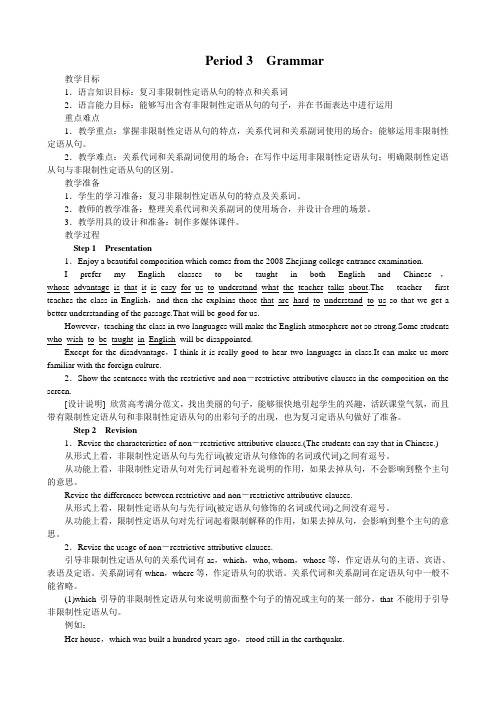
Period 3Grammar教学目标1.语言知识目标:复习非限制性定语从句的特点和关系词2.语言能力目标:能够写出含有非限制性定语从句的句子,并在书面表达中进行运用重点难点1.教学重点:掌握非限制性定语从句的特点,关系代词和关系副词使用的场合;能够运用非限制性定语从句。
2.教学难点:关系代词和关系副词使用的场合;在写作中运用非限制性定语从句;明确限制性定语从句与非限制性定语从句的区别。
教学准备1.学生的学习准备:复习非限制性定语从句的特点及关系词。
2.教师的教学准备:整理关系代词和关系副词的使用场合,并设计合理的场景。
3.教学用具的设计和准备:制作多媒体课件。
教学过程Step 1Presentation1.Enjoy a beautiful composition which comes from the 2008 Zhejiang college entrance examination.I prefer my English classes to be taught in both English and Chinese,whose_advantage_is_that_it_is_easy_for_us_to_understand_what_the_teacher_talks_about.The teacher first teaches the class in English,and then she explains those that_are_hard_to_understand_to_us so that we get a better understanding of the passage.That will be good for us.However,teaching the class in two languages will make the English atmosphere not so strong.Some students who_wish_to_be_taught_in_English_will be disappointed.Except for the disadvantage,I think it is really good to hear two languages in class.It can make us more familiar with the foreign culture.2.Show the sentences with the restrictive and non-restrictive attributive clauses in the composition on the screen.[设计说明] 欣赏高考满分范文,找出美丽的句子,能够很快地引起学生的兴趣,活跃课堂气氛,而且带有限制性定语从句和非限制性定语从句的出彩句子的出现,也为复习定语从句做好了准备。
人教版选修7英语 Unit 5 Travelling abroad reading 教案设计
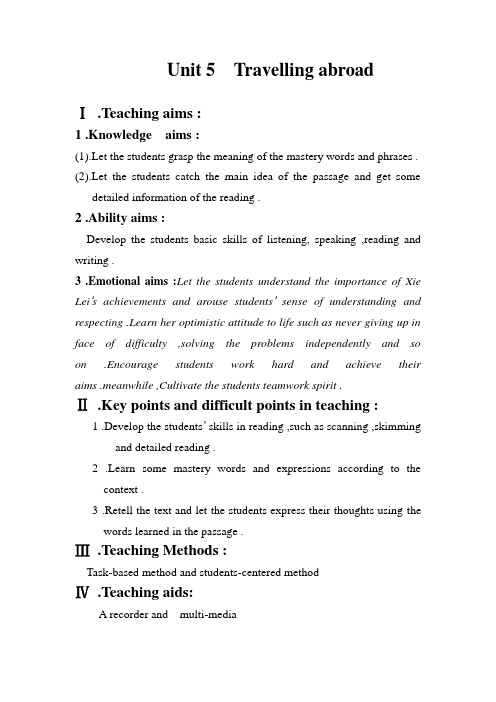
Unit 5 Travelling abroadⅠ.Teaching aims :1 .Knowledge aims :(1).Let the students grasp the meaning of the mastery words and phrases .(2).Let the students catch the main idea of the passage and get somedetailed information of the reading .2 .Ability aims :Develop the students basic skills of listening, speaking ,reading and writing .3 .Emotional aims :Let the students understand the importance of Xie Lei’s achievements and arouse students’sense of understanding and respecting .Learn her optimistic attitude to life such as never giving up in face of difficulty ,solving the problems independently and so on .Encourage students work hard and achieve their aims .meanwhile ,Cultivate the students teamwork spirit .Ⅱ.Key points and difficult points in teaching :1 .Develop the students’ skills in reading ,such as scanning ,skimmingand detailed reading .2 .Learn some mastery words and expressions according to thecontext .3 .Retell the text and let the students express their thoughts using thewords learned in the passage .Ⅲ.Teaching Methods :Task-based method and students-centered methodⅣ.Teaching aids:A recorder and multi-mediaⅤ.Teaching procedures:Step 1 .Preparation :Divide the students into four groups and get them to finish one task . Let the students find out words and expressions related to traveling and studying abroad .Step 2.Revision and leading-inThe world is getting smaller and smaller. We have more and more opportunities to travel or study abroad. Travelling helps us learn a lot about local customs and broaden our views. Besides, it is relaxing and we can get rid of our anxiety and stress.Step 3.Pre-reading :Discussion :What are the advantages and disadvantages of studying in a foreign country?Advantages :1. Learn standard English.2. Communicate with the local people3. Know the manners and customs of the country better.4. Help us to be independent.Disadvantages : 1.Be difficult for us to communicate with the foreignpeople and we should adapt to the situation quickly.2. Cost a lot of money.3. Miss our homes, miss our parents and friends. Step 4 Reading :1 .Scanning : match the main idea to each paragraph Para.1 Para.2 Para.3 Para.4 Para.5 Para.6 Para.7A. The general introduction to Xie Lei and her studyB. The advantages of living with a host family.C. Xie Lei, a Chinese girl, is studying in a foreign country--London.D. Xie Lei is getting used to the Western University’s way of learning.E.. The newspaper will follow Xie Lei’s progress in later editions.F. The difficulties Xie Lei met while living in London.G. Xie Lei feels much more at home in England now and is living an active life.2 .Skimming :Task 1 :Fill in the blanks.Of doing a preparation course1.to help her to __________ western ____________;2.to get used to ________________.of living with a host familyBenefits 1. to learn more about ________ and _________.2.to have people to explain things ____________.of having a tutor1. to explain about why she cannot ______ what otherpeople had said without _______________it.2. to ___________ her to express her own ideas.at the university1 .to learn to read ______ and ________the texts. Difficulties 2.to __________her own opinion with_______.of a new way of life1.to find a ____ between study and a ________.2.to make new ______.3 . Detailed readingTask 1 :Summarize the main idea of the whole text.It mainly talks about the Chinese student Xie Lei’s ___________, especially about some _______ she gets as well as some_______ she faces while studying in London.Task 2:DiscussionWhat kind of person do you think Xie Lei is? Find evidence in the article to support your opinion.4 .Post-reading :Interview :Suppose you are a newspaper reporter .Please interview Xie Lei .Step 5 Homework :1. Underline all the important and difficult phrases and sentences inthe text.2.Suppose you are Xie Lei , Write a letter to Your parents to tell them about your learning abroad.The designs on the blackboard:Step 1 .PreparationStep 2.Revision and leading-inStep 3.Pre-readingStep 4 Reading教学反思:。
人教版高二英语选修七Unit 5 Traveling Abroad教案设计
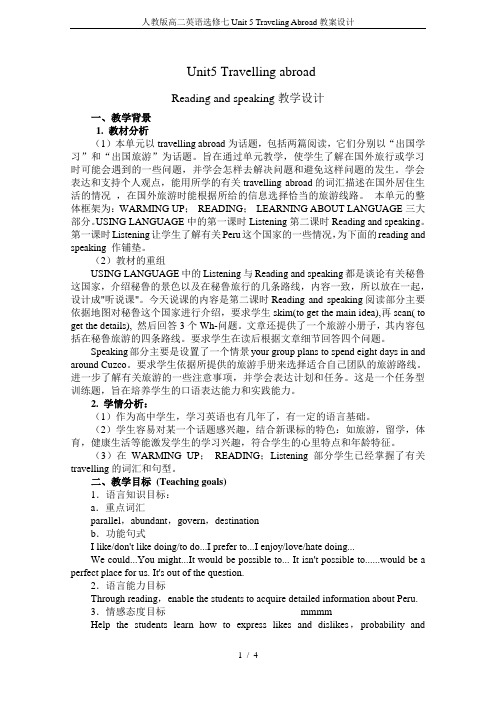
Unit5 Travelling abroadReading and speaking教学设计一、教学背景1. 教材分析(1)本单元以travelling abroad为话题,包括两篇阅读,它们分别以“出国学习”和“出国旅游”为话题。
旨在通过单元教学,使学生了解在国外旅行或学习时可能会遇到的一些问题,并学会怎样去解决问题和避免这样问题的发生。
学会表达和支持个人观点,能用所学的有关travelling abroad的词汇描述在国外居住生活的情况,在国外旅游时能根据所给的信息选择恰当的旅游线路。
本单元的整体框架为:WARMING UP;READING;LEARNING ABOUT LANGUAGE三大部分。
USING LANGUAGE中的第一课时Listening第二课时Reading and speaking。
第一课时Listening让学生了解有关Peru这个国家的一些情况,为下面的reading and speaking 作铺垫。
(2)教材的重组USING LANGUAGE中的Listening与Reading and speaking都是谈论有关秘鲁这国家,介绍秘鲁的景色以及在秘鲁旅行的几条路线,内容一致,所以放在一起,设计成"听说课"。
今天说课的内容是第二课时Reading and speaking阅读部分主要依据地图对秘鲁这个国家进行介绍,要求学生skim(to get the main idea),再scan( to get the details), 然后回答3个Wh-问题。
文章还提供了一个旅游小册子,其内容包括在秘鲁旅游的四条路线。
要求学生在读后根据文章细节回答四个问题。
Speaking部分主要是设置了一个情景your group plans to spend eight days in and around Cuzco。
要求学生依据所提供的旅游手册来选择适合自己团队的旅游路线。
人教版高中英语选修7《Unit 5 Travelling abroad》教案2篇

人教版高中英语选修7《Unit 5 Trav elling abroad》教案2篇The teaching plan of unit 5 travelling abroad编订:JinTai College人教版高中英语选修7《Unit 5 Travelling abroad》教案2篇前言:英语作为在许多国际组织或者会议上都是必需语言,几乎所有学校选择英语作为其主要或唯一的外语必修课。
英语教学涉及多种专业理论知识,包括语言学、第二语言习得、词汇学、句法学、文体学、语料库理论、认知心理学等内容。
本教案根据英语课程标准的要求和教学对象的特点,将教学诸要素有序安排,确定合适的教学方案的设想和计划、并以启迪发展学生智力为根本目的。
便于学习和使用,本文档下载后内容可按需编辑修改及打印。
本文简要目录如下:【下载该文档后使用Word打开,按住键盘Ctrl键且鼠标单击目录内容即可跳转到对应篇章】1、篇章1:人教版高中英语选修7《Unit 5 Travelling abroad》教案2、篇章2:人教版高中英语选修7《Unit 5 Travelling abroad》教案篇章1:人教版高中英语选修7《Unit 5 Travelling abroad》教案教学准备教学目标1.Students are able to summarize the general ideas of each paragraph by reading the text.2.Students can summarize the benefits and the difficulties of life abroad by reading again3.Students can learn about the Xie Lei’s character by discussion.4.Students can master some difficult words, phrases and sentences by explanation.教学重难点1.Students are able to summarize the general ideas of each paragraph by reading the text.2.Students can summarize the benefits and the difficulties of life abroad by reading again 教学过程教学过程Step 1 Warming upShow the beautiful scenery of other countries to attract students' attention,including the pyramids of Egypt,London Bridge,Sydney Opera House,Eiffel Tower,,Stonehenge,etc.Questions:1.Do you like traveling?2.If you have chance to go abroad, where would you like to go for travel?设计意图:课堂以欣赏国外优美的风光, 在给学生以极大的视觉享受的同时,激起他们对于出国旅行,学习的向往,至于最想去的国家或地方更能让他们有话可说。
(完整版)高中英语人教版选修7Unit5TravellingabroadGrammar教案(系列一)

选修七Unit 5 Travelling AbroadPeriod 3 GrammarI. Teaching aims:1. Ask the ss to find 5sentences in which non-restrictive attributive clause is included2. To learn the non-restrictive attributive clause3. Enable the ss to consolidate the grammar.II. ProceduresStep1. Find 5 sentences in which non-restrictive attributive clauses are used from the text:1.Xie Lei, who is 21 years old, has come to our university to study for a business qualification.2. She is halfway through the preparation year, which most foreign students complete before applying for adegree course.3. You’ve to get used to a whole new way of life, which can take up all your concentration in the beginning.4. Living with host families, in which there may be other college students, gives her the chance to learn moreabout the new culture.5. He wanted to know what I thought, which confused me because I thought that the author of the articleknew far more than I did.Step2.非限定性定语从句定语从句分为限制性定语从句(restrictive)和非限制性定语从句(non- restrictive )The teacher told me that Tom was the only person that I could depend on. 老师告诉我说汤姆是我唯一的可以依靠的人。
人教版高中英语选修7Unit 5Travelling abroad教案4
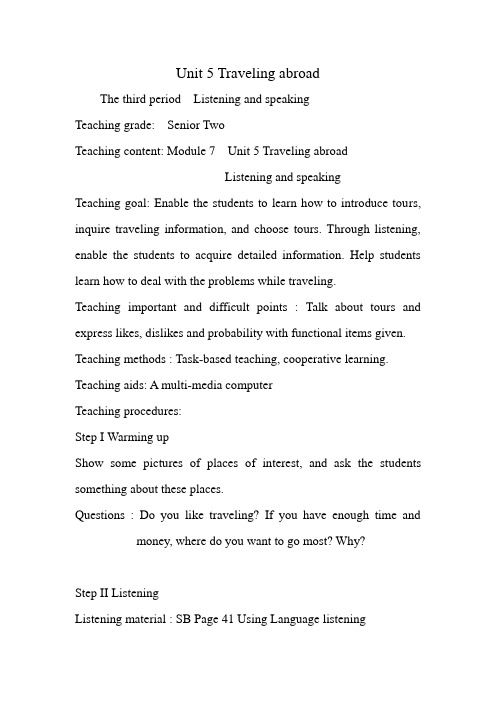
Unit 5 Traveling abroadThe third period Listening and speakingTeaching grade: Senior TwoTeaching content: Module 7 Unit 5 Traveling abroadListening and speakingTeaching goal: Enable the students to learn how to introduce tours, inquire traveling information, and choose tours. Through listening, enable the students to acquire detailed information. Help students learn how to deal with the problems while traveling.Teaching important and difficult points : Talk about tours and express likes, dislikes and probability with functional items given. Teaching methods : Task-based teaching, cooperative learning. Teaching aids: A multi-media computerTeaching procedures:Step I Warming upShow some pictures of places of interest, and ask the students something about these places.Questions : Do you like traveling? If you have enough time and money, where do you want to go most? Why?Step II ListeningListening material : SB Page 41 Using Language listening1 Listen for the first time and answer: Where is Lia planning to visit?2 Listen to the tape again and choose the right answer according to the question.1 Lia doesn’t like ________A to be independentB travel aloneC being hurried from place to place2 Which is Not the thing that Lia says she likes doing ? __________A Visiting museumsB Going to historical sightsC Going skiingD Looking at wildlife3 When she wanted some company she could _________A travel aloneB join a to ur groupC ask for friends’ helpStep III SpeakingTask 1:Talk about tours and discuss whether the tour is suitable with the expressions given :I like / don’t like doing / to do---I enjoy / love / hate doing---I prefer to ---You might ---It isn’t possible to --- would be a perfect place for us.I don’t think you’d enjoy --- would probably suit us Task 2:( A project ) Inquiring at the Travel Agency1) The whole class is divided into several groups and each group consists of four students.2) Each group is a travel agency. Showing out the postcards finished by each group in advance, the students imitate something happening in travel agencies to practice their English. (Student A, Student B, Student C in each group act as travel clerks in one travel agency. Student D in each group acts as a traveler to inquire about tour information from another travel agency. )Task 3: Report the inquiring result.Ask student D in each group to report his or her result, and the other students give their marks to each student D in the evaluation form according to his or her presentation, and decide the best group.Step IV ListeningListening material : SB Page 81 Listening TaskListen to the conversation twice and complete the following formStep V Problem solvingGet students to act out one of the following situations in groups1 You are a stranger in New York, you want to spend 3 days in traveling around, you want to ask a native’s suggestions.2 While traveling in Beijing, you lose your way, but you want to go to Qinghua University.3 While climbing Baiyun Mountain in Guangzhou, you have your leg injured.Step VI HomeworkWrite about problems that travelers might experience while traveling and the ways of preventing and dealing with them. Hand in the detailed inquiring report tomorrow.。
人教版高中英语选修7优秀教案Unit5Travelling abroadPeriod 4新
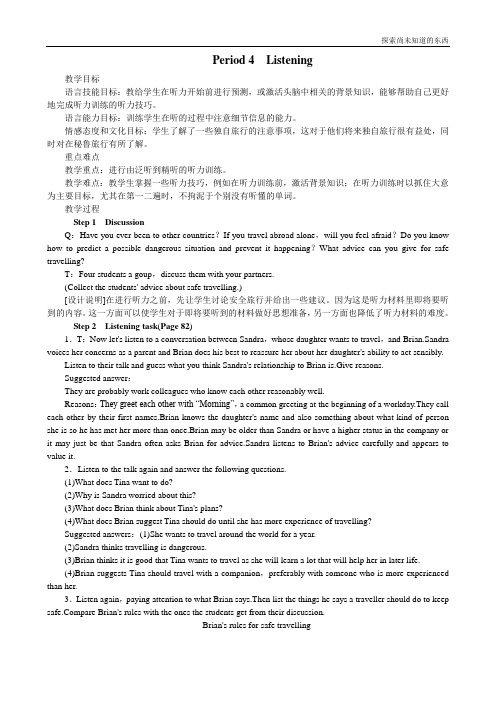
Period 4Listening教学目标语言技能目标:教给学生在听力开始前进行预测,或激活头脑中相关的背景知识,能够帮助自己更好地完成听力训练的听力技巧。
语言能力目标:训练学生在听的过程中注意细节信息的能力。
情感态度和文化目标:学生了解了一些独自旅行的注意事项,这对于他们将来独自旅行很有益处,同时对在秘鲁旅行有所了解。
重点难点教学重点:进行由泛听到精听的听力训练。
教学难点:教学生掌握一些听力技巧,例如在听力训练前,激活背景知识;在听力训练时以抓住大意为主要目标,尤其在第一二遍时,不拘泥于个别没有听懂的单词。
教学过程Step 1DiscussionQ:Have you ever been to other countries?If you travel abroad alone,will you feel afraid?Do you know how to predict a possible dangerous situation and prevent it happening?What advice can you give for safe travelling?T:Four students a goup,discuss them with your partners.(Collect the students' advice about safe travelling.)[设计说明]在进行听力之前,先让学生讨论安全旅行并给出一些建议。
因为这是听力材料里即将要听到的内容。
这一方面可以使学生对于即将要听到的材料做好思想准备,另一方面也降低了听力材料的难度。
Step 2Listening task(Page 82)1.T:Now let's listen to a conversation between Sandra,whose daughter wants to travel,and Brian.Sandra voices her concerns as a parent and Brian does his best to reassure her about her daughter's ability to act sensibly.Listen to their talk and guess what you think Sandra's relationship to Brian is.Give reasons.Suggested answer:They are probably work colleagues who know each other reasonably well.Reasons:They greet each other with “Morning”,a common greeting at the beginning of a workday.They call each other by their first names.Brian knows the daughter's name and also something about what kind of person she is so he has met her more than once.Brian may be older than Sandra or have a higher status in the company or it may just be that Sandra often asks Brian for advice.Sandra listens to Brian's advice carefully and appears to value it.2.Listen to the talk again and answer the following questions.(1)What does Tina want to do?(2)Why is Sandra worried about this?(3)What does Brian think about Tina's plans?(4)What does Brian suggest Tina should do until she has more experience of travelling?Suggested answers:(1)She wants to travel around the world for a year.(2)Sandra thinks travelling is dangerous.(3)Brian thinks it is good that Tina wants to travel as she will learn a lot that will help her in later life.(4)Brian suggests Tina should travel with a companion,preferably with someone who is more experienced than her.3.Listen again,paying attention to what Brian says.Then list the things he says a traveller should do to keep pare Brian's rules with the ones the students get from their discussion.Brian's rules for safe travelling________________________________________________________________________________________________________________________________________________________________________________________________________________________________________________________________________________________________________________________________________________________________________________________________________________________________________________________________________________________________________________________________________________________________________________________________Suggested answers:*Research the places you are going to visit.*Pay attention to what is happening around you.*Ask the locals for advice and follow it.*Observe how the people around you behave towards you.*Learn how to tell who you can and can't trust.*At first travel with a more experienced companion.[设计说明]听完第一遍对话后,要求学生推测对话的两个人的关系,然后再注意细节问题的答案,还是体现了由大到小、由粗到细的原则,也符合人们的感知规律。
- 1、下载文档前请自行甄别文档内容的完整性,平台不提供额外的编辑、内容补充、找答案等附加服务。
- 2、"仅部分预览"的文档,不可在线预览部分如存在完整性等问题,可反馈申请退款(可完整预览的文档不适用该条件!)。
- 3、如文档侵犯您的权益,请联系客服反馈,我们会尽快为您处理(人工客服工作时间:9:00-18:30)。
Unit 5 Travelling abroad I.单元教学目标III. 教材分析与教材重组1. 教材分析本单元以travelling abroad为话题,旨在通过单元教学,使学生了解在国外旅行或学习时可能会遇到的一些问题,并学会怎样去解决问题和避免这样问题的发生。
学会表达和支持个人观点,能用所学的有关travelling abroad的词汇描述在国外居住生活的情况,在国外旅游时能根据所给的信息选择恰当的旅游线路,能推测什么事情可能会发生,哪种情况不会发生,会正确使用非限制性定于从句。
1.1WARMING UP 提供了四个有关旅行的问题,让学生用已有的知识和经验讨论在国外居住或旅行会遇到什么问题,并且该如何来解决这些问题。
1.2 PRE-READING是READING的热身活动。
提供了两个问题,它要求采用与同学讨论交流的方式谈论在国外学习的利与弊,激发同学们的学习兴趣。
1.3 READING是一篇介绍中国女孩谢蕾在伦敦学习的情况。
使学生对比在国内学习与在国外学习的不同。
Try to understand some of the benefits and difficulties she has in London.1.4 COMPREHENDING练习1通过四个问题来检查学生对课文的细节的理解。
练习2以图表的形式来分析在国外学习的利与弊。
练习3设置了五个讨论题,通过这些话题的谈论,挖掘文章的深层含义,激活学生自身的认知能力和思想认识能力。
练习4是概括能力训练题,在理解的基础上,重点训练学生的概括能力。
1.5 LEARNING ABOUT LANGUAGE分词汇和语法两部分。
其中,Discovering useful words and expressions是训练学生在语境中掌握词汇的能力,帮助学生加强动词变化形式的意识。
Revising useful structures 是关于非限制性定于从句,旨在训练学生对定语从句的理解、掌握和运用,并通过语法练习加以巩固。
1.8 USING LANGUAGE中的第一部分Listening要求学生先根据秘鲁的地图谈论有关秘鲁这个国家的一些情况, 然后完成三个相应的任务型练习。
首先是要求学生在听第一遍时能完成听力练习1的任务,即:选择那些是Lia喜欢做的事;听第二遍是要求学生回答五个问题;练习3是填空题。
通过这些题,培养学生学会获取听力材料中的具体用词和细节要点,同时让学生了解有关Peru这个国家的一些情况,为下面的reading and speaking 作铺垫。
第二部分Reading and speaking 作为一个整体教学材料。
阅读部分主要依据地图对秘鲁这个国家进行介绍,要求学生skim(to get the main idea),再scan( to get the details), 然后回答3个Wh-问题。
然后为大家提供了一个旅游小册子,其内容包括在秘鲁旅游的四条路线。
要求学生在读后根据文章细节回答四个问题。
Speaking部分主要是设置了一个情景your group plans to spend eight days in and around Cuzco。
要求学生依据所提供的旅游手册来选择适合自己团队的旅游路线。
进一步了解有关旅游的一些注意事项,并学会表达计划和任务。
这是一个任务型训练题,旨在培养学生的口语表达能力和实践能力。
1.9 WRITING 要求学生给一位即将到中国来学习的美国笔友写一封信,在信中向他介绍中国的一些情况,在中国的学习、生活中可能会遇到的问题及解决问题的办法,告诉他怎样更好的学习中国的文化以及你将提供给他的帮助。
2. 教材重组2.1 从话题内容上分析,WARMING UP 与READING相一致;而从训练目的上分析与TALKING比较一致。
从教材份量来说,可将WARMING UP与Workbook中的TALKING, SPEAKING TASK整合在一起,设计成一节任务型“口语课”。
2.2 可将PRE-READING, READING与COMPREHENDING三个活动整合在一起上一节“阅读课”。
2.3 USING LANGUAGE中的Listening与Reading and speaking都是谈论有关秘鲁这个国家,介绍秘鲁的景色以及在秘鲁旅行的几条路线,内容一致,所以放在一起,设计成一节"听说课"。
2.4可将LEARNING ABOUT LANGUAGE 与Workbook中的LISINGSTRUCTURES语法练习题整合在一起上一节“语法课”。
2.5 可将Workbook 中的Listening与Reading Task 与Writing Task 整合起来,上一节“综合实践课”。
2.6将WRITING 与Learning Tip 与Workbook中Project整合成一节“写作课”。
3. 课型设计与课时分配(经教材分析,根据学情,本单元可以用六课时教完)1st period Speaking2nd period Reading3rd period Listening and Speaking4th period Grammar5th period Integrating skills6th period WritingⅣ. 分课时教案The First Period SpeakingTeaching goals 教学目标1. Target language目标语言:a. 重点词汇和短语adjust to,advantage,find out ,youth hostels,communityb. 交际用语expressing and supporting an opinionYou might …It’s a possibility...Probably…It’s (very) possible that...It could happen.Most probably...It’s not very likely… I doubt it.He/She/They will probably...2. Ability goals能力目标Enable the students to discuss what they would learn when traveling or living in another country. And how to deal with the problems and dangers that could happen while traveling in a foreign country.3. Learning ability goals 学能目标Help the students learn how to deal with the problem that they could meet while traveling..Teaching important points教学重点Let students learn to use the structures of expressing and solve the problems. Teaching difficult points 教学难点How to deal with the problems that are likely to happen when traveling and how to prevent them.Teaching methods教学方法1. Looking at the questions. (individuals).2. Pairs work to discuss and work in groups of four.(task-based , cooperative learning).Teaching aids教具准备1. A computer2. A projectorTeaching procedures & ways教学过程与方法Step I Greeting and RevisionT: Good morning/afternoon, boys and girls! First, let’s check the homework.1.Check whether they have remembered the ten important sentences.2.Check whether they have previewed the new words and expressions in this unit.Step II Warming up*Talk about the problems with the teacher’s help.T: If you had chance to go abroad in the world, which country would you like to visit and why ? and what kind of things would you meet or learn best? Look at the problems on Page 37. You can discuss the following questions with your partner. Qs: 1.If you could go anywhere in the world, which country would you like to visit and why?2. What kind of things would you learn best by being a tourist in a country andwhat would you learn best by working or studying there?3. How differences or easy do you think it is to adjust to living or traveling inanother country? What kind of differences might you experience?4. Have you talked to anyone who has spent some time in another country? Whatdid they find unusual or difficult about it?DiscussionSa: If I had chance to travel abroad, I’d like to visit New Zealand. It’s said that it’s a beautiful country, I’d like to enjoy the beautiful scenery in New Zealand.Sb: If I had chance, I’d like to go to America. Maybe it is better if I could work or study there, then I could learn English well.Sc: I ‘d like to go to Egypt, because I want to know about the ancient culture.T: What kind of things would you learn best by being a tourist in a country and what would you learn best by working or studying there?Sa: When we travel to another country, maybe we could know about the architecture of the country, the beautiful scenery, the economic situation and so on.Sb: When we work or study in the country, maybe we could know more about the manners and customs of the country. We could learn the standard English better, we could communicate with the local people to improve our English.Sc: If we could live with the local people, we could know the proprieties of the country, know more slang, know the difference in time, food, transportation etc. between the two countries.T: Very good. You can think so many things. Have you talked to anyone who has spent some time in another country? What did they find unusual or difficult about it? Ss: Well, I have talked to my friend who had been to a foreign country, he told me something different or interesting in the foreign country. For example, in India, most people don’t eat me at, especial beef, they like to eat vegetables and fruits, so if you invite an Indian for dinner, never order steak for them.Step III SpeakingT: Well, we talked about the things that we could learn while we traveling or studying in a foreign country. Then, what kind of problems or dangers would happen while traveling in a foreign country? Now, turn at page to P82, try to list the dangers andproblems, then discuss ways you could prevent these things happening in groups. The following sentence patterns are helpful for you:You might… Most probably, …It’s a possibility… It’s likely/unlikely that…Probably, … It’s not very likely… I doubt it. It’s (very) possible… He/She/They will probably.It could happen.(After a few minutes)T: Well, are you ready ? Who’d like to show us your opinion?Sa: While traveling, it’s possible that you could lose you way, because you don’t know the country very well. To prevent this:◆You’d better take a map of the country with you.◆Don’t leave alone without saying a word.◆Pay attention to the conspicuous signs, for example, some famous buildings,some special road signs so that you can ask the way while you are lost.Sb: It’s likely that we could meet malefactors--- robber, thief or others. Probably, we will be hurt. To prevent this:◆Don’t show your valuable belongings to others.◆You’d better go along with other people.◆Should you face dangers, connect the police.Sc: It’s (ve ry) possible that we could have difficulty in communicating with the local people. To prevent this:◆Try to grasp the simple and basic communicated language◆Try to know about the manners and customs of the country◆Try to be familiar with formality in everyday lifeStep IV Talking (若时间不足,可改为作业)T: OK! So much for the questions. You did a very good job, I’m sure that you have known how to deal with the problems while traveling or studying in a foreign country. If we wanted travel alone with a little money, could you find a good way tosave money?Sa: Maybe we could travel on foot or by second-class rail.Sb: We could stay at the small inn to save money, but maybe the situation there is not good.T: Well, there is a good and not expensive place for travellers--- Youth Hostels, Hostels provide clean safe place to stay and have community kitchens. Now, let’s read something about Youth Hostels and discuss the questions in groups.(5 minutes later.)T: OK. Let’s look at the questions. Are youth hostels expensive or cheap to stay in? Ss: They are cheap. They offer quality accommodation at low cost.T: Yes. And how many people share a bedroom in a hostel?Ss: There are 4,5, or 6 people.T: What is the advantage of staying in a place with a kitchen when you are traveling? Ss: If there were a kitchen in the hostel, I could cook by myself, it’s It is good economy to cook on my own.T: What is the advantage of having a Youthpass?Ss: Youthpass offers travelers cheap train fares in most European countries. It can make you maximize your time and minimize your cost.T: How old must you be to get a Youthpass?Ss: For those under age 26 on their first day of travel.T: Why is it a good idea to buy travel insurance?Ss: Because while traveling, we may face unexpected illness or accident, no matter where you go to in the world, the cost of medical treatment can be very high, if you buy travel insurance, it can afford all medical treatment of you while traveling abroad. T: Then would you enjoy staying in a youth hostel? Why?Ss: Though there are many advantages of staying in a youth hostel, I still like to travel in collective tour. Tourists can help each other in case of an emergency.Ss: Well, I like youth hostel very much. Because I like traveling on my own, I like to enjoy the sense of freedom, I can do whatever I like. Also, it’s convenient for traveler to stay in youth hostel.T: Good. There is little time, let’s look at our homework. Step V Homework1.Learn the new words and expressions by heart 2.Let students talk about their experiences of travelling。
